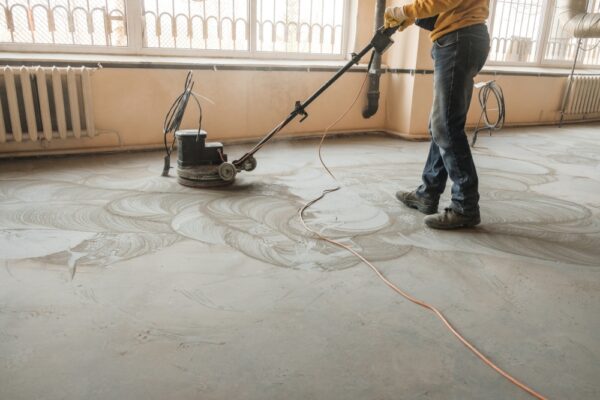If you’ve recently installed concrete flooring in your home, garage, or patio, you are probably aware of how difficult it is to clean and maintain. Having a concrete floor has many benefits, but when it comes to upkeep, you have to put in some work to make sure you don’t end up ruining your space. Although concrete is durable and long-lasting, if it is not properly maintained, it can fall to the elements rather quickly.
Concrete flooring is porous by nature, which makes it susceptible to promptly absorbing stains that later resist cleaning. Therefore, It’s crucial that you understand how to maintain and clean concrete flooring correctly. For this, you’ll have to follow a proper clean-up and maintenance plan which is discussed below.
-
Clean It Regularly
Concrete floors are more prone to dust buildup than other types of flooring. In order to avoid this, it is crucial to regularly sweep, vacuum, or dust mop the floor. This will also ensure that you keep abrasive dirt particles off of your concrete flooring. While this is the simplest step, it is also the most crucial as it guarantees the long-term shine, and strength of the concrete. To best clean the concrete floor, you should incorporate a daily dust mopping routine to ensure clarity.
While dust mopping is an essential part of the cleanup routine, it should be followed through with a weekly wet mopping of the concrete floor. Make sure to use a clean mop, and clean water to wash away any grime or dirt that might have accumulated.
-
Use A pH-Neutral Cleaner
Using the wrong type of cleaner can cause prominent damage to your floor, especially if the concrete flooring is involved. Because of its porous nature, concrete flooring is more easily deformed when exposed to chemical-rich, acidic, or alkaline cleaners. This results in a floor that looks worn out and damaged. So, make sure you use a pH-neutral cleaner to mop the concrete flooring. Don’t forget to add some water to the cleaner to dilute the chemicals and prevent discoloring, or abrading the flooring material.
Make sure to stay away from cleaning products that are particularly strong or include highly acidic ingredients. You won’t experience any issues if you stick to the straightforward, neutral ph cleaners, or opt for DiamaPro chemical treatments for all of your concrete needs to avoid experimenting with different products. To avoid damaging the concrete. You should also try to mop in the same direction as the concrete’s grain. Furthermore, it’s best to wait until the floor has completely dried after wet mopping before placing rugs or even allowing foot traffic.
-
Apply Protective Coating
To maintain the shine on the concrete, you need to apply a protective coating after thoroughly cleaning the floor and allowing it to dry. For this purpose, a vast selection of sealants is available. So, choose one according to the requirements of your flooring material.
- Acrylic Sealants – water-based sealers that form a protective surface on concrete flooring. Not only are they easy to apply, but also come in a range of colors.
- Solvent-based Sealants – this variety of sealants provides a higher level of protection against stains, spills, and moisture. They can be either oil-based or alcohol-based.
- Epoxy Sealants – water-based sealers that form a strong, protective coating that is chemical resistant and ensures maximum shielding from the elements.
- Para-Aminobenzoic Acid (PABA) Sealants – acrylic-based sealers that provide complete protection against UV damage, stains, and spills.
- Floor Wax – available in liquid and paste form, floor waxes can be applied and reapplied on concrete floors to obtain a durable, polished finish.
Make certain that you go through the instructions for each product carefully before you begin to apply it to the concrete floor. For good measure, test the sealant on a small region of the concrete floor first to check if it’s suitable for your floor. Make sure the sealant has completely dried before using the floor again.
-
Wash Spills Immediately
Even though most sealants and floor waxes guarantee stain resistance, you shouldn’t let a spill remain on your floor for long enough to find out. It’s tough to predict if the sealant was rubbed off or whether you missed a location when applying it, but once a stain has settled, it will be nearly impossible to remove. So, make sure to clean any spills on the concrete as soon as you can. A good idea is to use rugs or carpets in high-traffic areas to avoid getting the concrete stained.
Concrete is one of the most versatile, durable, and long-lasting flooring materials there is. However, it comes with a set of maintenance requirements that have to be met. Otherwise, the concrete loses its shine, and strength, which is what made it special in the first place. Although the maintenance requires some effort, it is not too complex to follow through.
